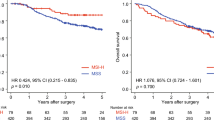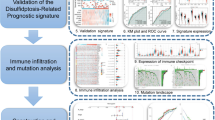Abstract
Diffuse type gastric cancer (DGC), a pathological subtype, is one of the most common malignant solid tumors, and mortality of this tumor is not negligible, especially in early-onset cancer patients. In fact, affirmative personalized treatments based on gene profile have not been established yet. The aim of this study was to provide the possible genotype-matched treatment for DGC through comprehensive examination of genomic variants and analysis of clinicopathological characteristics. We retrospectively studied 23 formalin-fixed, paraffin-embedded samples of patients diagnosed as DGC between January 2003 and December 2015 at the Department of Cancer Pathology, Hokkaido University Graduate School of Medicine. The cases were divided into two groups: early-onset (< 50 years old) and elderly-onset (≥ 50 years old) DGC groups. We performed targeted genomic sequencing using a 163 cancer-related gene panel. The sequencing data were analyzed using an original bioinformatics pipeline called GenomeJack and were clinicopathologically evaluated. Intestinal metaplasia and atrophy were highly observed in the adjacent non-cancerous mucosa in the elderly-onset DGC group compared with those in the early-onset DGC group. The number of somatic variants was significantly higher in the elderly-onset DGC group than in the early-onset DGC group. Fifteen patients (65.2%) harbored at least one genomic alteration of the potential target for genotype-matched treatment. In addition, one patient with hypermutation phenotype was diagnosed as Lynch syndrome due to MLH1 mutation, suggesting the sensitivity for the treatment with immune checkpoint inhibitors. Not only does our study demonstrated the potential utility of the targeted genomic sequencing approach for making informed therapeutic decisions, but it also sheds light on DGC pathogenesis and progression.


Similar content being viewed by others
Abbreviations
- GC:
-
Gastric cancer
- NGS:
-
Next generation sequencing
- EBV:
-
Epstein-barr virus
- DGC:
-
Diffuse type of gastric cancer
- FFPE:
-
Formalin-fixed, paraffin embedded
- TNM:
-
Tumor-node-metastasis
- IHC:
-
Immunohistochemical
- PARP:
-
Poly ADP-ribose polymerase
- HDAC:
-
Histone deacetylase
- EZH2:
-
Enhancer of zeste homolog 2
- BTK:
-
Bruton’s tyrosine kinase
- HER2:
-
Human epidermal growth factor receptor 2
- CDK:
-
Cyclin-dependent kinase
- FGFR:
-
Fibroblast growth factor receptor
- mTOR:
-
Mammalian target of rapamycin
- ASPP:
-
Apoptosis-stimulating protein of p53
- SHP2:
-
Src homology 2 domain containing protein tyrosine phosphatase 2
- FAK:
-
Focal adhesion kinase
- LOH:
-
Loss of heterozygosity
References
Cancer Registry and Statistics. Cancer Information Service, National Cancer Center, Japan.
Vital Statistics Japan (Ministry of Health, Labour and Welfare).
Ding SZ, Goldberg JB, Hatakeyama M. Helicobacter pylori infection, oncogenic pathways and epigenetic mechanisms in gastric carcinogenesis. Fut Oncol (London, England). 2010;6(5):851–62.
Lopez-Basave HN, Morales-Vasquez F, Ruiz-Molina JM, Namendys-Silva SA, Vela-Sarmiento I, Ruan JM, et al. Gastric cancer in young people under 30 years of age: worse prognosis, or delay in diagnosis? Cancer Manage Res. 2013;5:31–6.
Theuer CP, de Virgilio C, Keese G, French S, Arnell T, Tolmos J, et al. Gastric adenocarcinoma in patients 40 years of age or younger. Am J Surg. 1996;172(5):473–6 (discussion 6–7).
Kakiuchi M, Nishizawa T, Ueda H, Gotoh K, Tanaka A, Hayashi A, et al. Recurrent gain-of-function mutations of RHOA in diffuse-type gastric carcinoma. Nat Genet. 2014;46(6):583–7.
Yemelyanova A, Vang R, Kshirsagar M, Lu D, Marks MA, Shih Ie M, et al. Immunohistochemical staining patterns of p53 can serve as a surrogate marker for TP53 mutations in ovarian carcinoma: an immunohistochemical and nucleotide sequencing analysis. Mod Pathol. 2011;24(9):1248–53.
Hayashi H, Tanishima S, Fujii K, Mori R, Okamura Y, Yanagita E, et al. Genomic testing for pancreatic cancer in clinical practice as real-world evidence. Pancreatology. 2018;18(6):647–54.
Meng W, Bai B, Sheng L, Li Y, Yue P, Li X, et al. Role of helicobacter pylori in gastric cancer: advances and controversies. Discov Med. 2015;20(111):285–93.
Wei J, O’Brien D, Vilgelm A, Piazuelo MB, Correa P, Washington MK, et al. Interaction of Helicobacter pylori with gastric epithelial cells is mediated by the p53 protein family. Gastroenterology. 2008;134(5):1412–23.
Li N, Xie C, Lu NH. p53, a potential predictor of Helicobacter pylori infection-associated gastric carcinogenesis? Oncotarget. 2016;7(40):66276–86.
Tsutsumi R, Takahashi A, Azuma T, Higashi H, Hatakeyama M. Focal adhesion kinase is a substrate and downstream effector of SHP-2 complexed with Helicobacter pylori CagA. Mol Cell Biol. 2006;26(1):261–76.
Cho SY, Park JW, Liu Y, Park YS, Kim JH, Yang H, et al. Sporadic early-onset diffuse gastric cancers have high frequency of somatic CDH1 alterations, but low frequency of somatic RHOA mutations compared with late-onset cancers. Gastroenterology. 2017;153(2):536.
Mizutani A, Yashiroda Y, Muramatsu Y, Yoshida H, Chikada T, Tsumura T, et al. RK-287107, a potent and specific tankyrase inhibitor, blocks colorectal cancer cell growth in a preclinical model. Cancer Sci. 2018;109(12):4003–14.
Tang W, Liu R, Yan Y, Pan X, Wang M, Han X, et al. Expression of estrogen receptors and androgen receptor and their clinical significance in gastric cancer. Oncotarget. 2017;8(25):40765–77.
Wang C, Jette N, Moussienko D, Bebb DG, Lees-Miller SP. ATM-deficient colorectal cancer cells are sensitive to the PARP inhibitor olaparib. Transl Oncol. 2017;10(2):190–6.
Moore K, Colombo N, Scambia G, Kim BG, Oaknin A, Friedlander M, et al. Maintenance Olaparib in patients with newly diagnosed advanced ovarian cancer. New Engl J Med. 2018;379(26):2495–505.
Srinivasan G, Sidhu GS, Williamson EA, Jaiswal AS, Najmunnisa N, Wilcoxen K, et al. Synthetic lethality in malignant pleural mesothelioma with PARP1 inhibition. Cancer Chemother Pharmacol. 2017;80(4):861–7.
Sacco JJ, Kenyani J, Butt Z, Carter R, Chew HY, Cheeseman LP, et al. Loss of the deubiquitylase BAP1 alters class I histone deacetylase expression and sensitivity of mesothelioma cells to HDAC inhibitors. Oncotarget. 2015;6(15):13757–71.
Sun C, Zhao C, Li S, Wang J, Zhou Q, Sun J, et al. EZH2 expression is increased in BAP1-mutant renal clear cell carcinoma and is related to poor prognosis. J Cancer. 2018;9(20):3787–96.
Wang JD, Chen XY, Ji KW, Tao F. Targeting Btk with ibrutinib inhibit gastric carcinoma cells growth. Am J Transl Res. 2016;8(7):3003–12.
Ogiwara H, Sasaki M, Mitachi T, Oike T, Higuchi S, Tominaga Y, et al. Targeting p300 addiction in CBP-deficient cancers causes synthetic lethality by apoptotic cell death due to abrogation of MYC expression. Cancer Discov. 2016;6(4):430–45.
Cocco E, Javier Carmona F, Razavi P, Won HH, Cai Y, Rossi V, et al. Neratinib is effective in breast tumors bearing both amplification and mutation of ERBB2 (HER2). Sci Signal. 2018;11(551):eaat9773.
Gyanchandani R, Kota KJ, Jonnalagadda AR, Minteer T, Knapick BA, Oesterreich S, et al. Detection of ESR1 mutations in circulating cell-free DNA from patients with metastatic breast cancer treated with palbociclib and letrozole. Oncotarget. 2017;8(40):66901–11.
Van Cutsem E, Karaszewska B, Kang YK, Chung HC, Shankaran V, Siena S, et al. A multicenter phase 2 study of AMG 337 in patients with MET-amplified gastric/gastroesophageal junction/esophageal adenocarcinoma and other solid tumors. Clin Cancer Res. 2018;25:2414.
Zhao L, Li X, Song N, Li A, Hou K, Qu X, et al. Src promotes EGF-induced epithelial-to-mesenchymal transition and migration in gastric cancer cells by upregulating ZEB1 and ZEB2 through AKT. Cell Biol Int. 2018;42(3):294–302.
Yang Y, Zhu F, Wang Q, Ding Y, Ying R, Zeng L. Inhibition of EZH2 and EGFR produces a synergistic effect on cell apoptosis by increasing autophagy in gastric cancer cells. OncoTargets Ther. 2018;11:8455–63.
Qin A, Johnson A, Ross JS, Miller VA, Ali SM, Schrock AB, et al. Detection of known and novel FGFR fusions in non-small cell lung cancer by comprehensive genomic profiling. J Thoracic Oncol. 2019;14(1):54–62.
Palsgrove DN, Li Y, Pratilas CA, Lin MT, Pallavajjalla A, Gocke C, et al. Eosinophilic Solid and Cystic (ESC) Renal Cell Carcinomas Harbor TSC Mutations: molecular Analysis Supports an Expanding Clinicopathologic Spectrum. Am J Surg Pathol. 2018;42(9):1166–81.
Bellmunt J, Lalani AA, Jacobus S, Wankowicz SA, Polacek L, Takeda DY, et al. Everolimus and pazopanib (E/P) benefit genomically selected patients with metastatic urothelial carcinoma. Br J Cancer. 2018;119(6):707–12.
Dudley JC, Lin MT, Le DT, Eshleman JR. Microsatellite Instability as a Biomarker for PD-1 Blockade. Clini Cancer Res. 2016;22(4):813–20.
Funding
This research is (partially) supported by the Program for an Integrated Database of Clinical and Genomic Information from Japan Agency for Medical Research and development (JP19ck0106406), AMED and also by Japan Society for the Promotion of Science (Grant Nos. 1 7 K 1 0 8 5 5, 1 7 K T 0 0 4 6).
Author information
Authors and Affiliations
Corresponding author
Ethics declarations
Conflict of interest
The authors declare that they have no conflict of interest.
Additional information
Publisher's Note
Springer Nature remains neutral with regard to jurisdictional claims in published maps and institutional affiliations.
Electronic supplementary material
Below is the link to the electronic supplementary material.
Rights and permissions
About this article
Cite this article
Ishikawa, M., Hayashi, H., Sakamoto, N. et al. Cancer gene profiling explores the possible precision medicine for diffuse-type gastric adenocarcinoma. Med Oncol 37, 10 (2020). https://doi.org/10.1007/s12032-019-1327-4
Received:
Accepted:
Published:
DOI: https://doi.org/10.1007/s12032-019-1327-4




